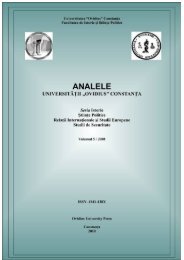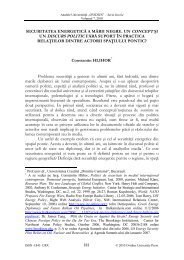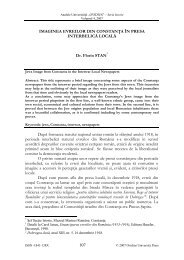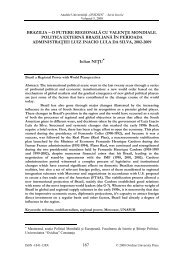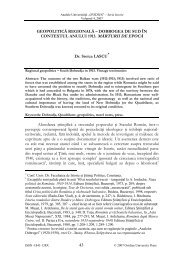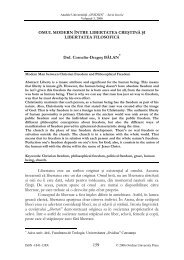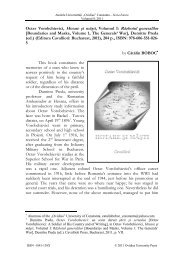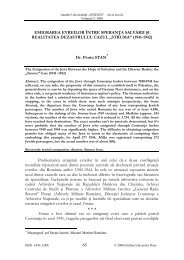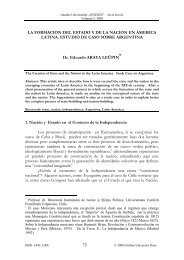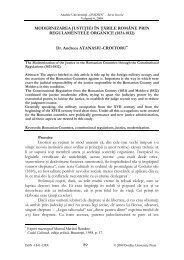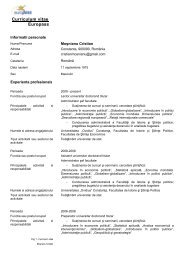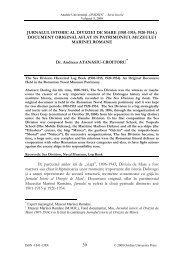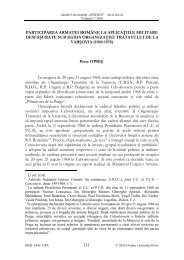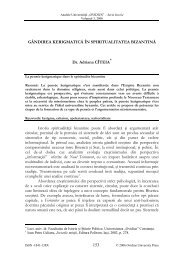analele universitÄÅ£ii âovidiusâ constanÅ£a - AUOCSI
analele universitÄÅ£ii âovidiusâ constanÅ£a - AUOCSI
analele universitÄÅ£ii âovidiusâ constanÅ£a - AUOCSI
You also want an ePaper? Increase the reach of your titles
YUMPU automatically turns print PDFs into web optimized ePapers that Google loves.
Confronting the Future. The Balkans. A Systematic, Comparative Retrospection<br />
Analele Universităţii „OVIDIUS” / Vol. 6/ 2009<br />
Undoubtedly, that since the ‘90s, the United States and the international<br />
community have achieved substantial achievements in the Balkans. The wars<br />
have ended. The countries of the region are undertaking political and economic<br />
reforms and aligning their foreign policies toward Euro-Atlantic institutions.<br />
U.S. officials have stated that ensuring the stability of the Balkans is an<br />
important part of a U.S. vital interest in securing a Europe whole, free, and at<br />
peace. For more than thirteen years, the United States has provided significant<br />
aid and troop deployments to the Balkans in support of this goal. Both aid<br />
amounts and the U.S. troop commitments have declined as the region has<br />
stabilized and more pressing U.S. foreign policy priorities have emerged. At the<br />
same time, the European Union has increased its role, with the finality of<br />
extending EU membership to the countries of the region 23 .<br />
Observers notice that the United States has political credibility in the<br />
region, particularly among Bosniaks and Albanians, which the Europeans may<br />
lack. In this regard, some analysts indicate that greater U.S. diplomatic<br />
engagement is needed to re-energize constitutional reforms in Bosnia, which<br />
have dwindled since 2006. The region may have a higher strategic profile<br />
established on the U.S. use of military bases in Romania and Bulgaria, which<br />
could be advantageous for U.S. operations in the Middle East. Persistent U.S.<br />
attention may also be needed to annihilate possible terrorist networks in the<br />
region 24 .<br />
<br />
From another point of view, from a more philosophical approach, the<br />
present is highly unstable, that is something we can be certain of. It works like a<br />
tesseract between yesterday’s qualms and apparent problems with no obvious<br />
solution in sight and tomorrow’s mended expectations, promising prospects and<br />
a persistent, looming shadow of a doubt. For the better of twenty years, the<br />
notion of security and more precisely, our perception of what security should<br />
represent has been unequivocally at odds with certain parts of the Balkans. Let’s<br />
take for example, Albania, were streets were divided between ethnic/ religious<br />
families. Or Kosovo, where in the name of freedom, security has been forsaken.<br />
The moral of the story is that one can be free without achieving a secure<br />
medium, without acknowledging how imperative peace should be.<br />
Zygmunt Bauman 25 , in the book Community: Seeking Safety in an Insecure<br />
World 26 , theorizes that those two notions – freedom and security, are mutually<br />
23 Steven Woehrel, Future of the Balkans and U.S. Policy Concerns, CRS Report for<br />
Congress, p. 3, accessed: November, 22, 2009, at:<br />
http://www.fas.org/sgp/crs/row/RL32136.pdf..<br />
24 Ibidem, pp. 5-7.<br />
25 Zygmunt Bauman is Professor of Sociology, at the University of Leeds, UK and Warsaw.<br />
26 Zygmunt Bauman, Community: Seeking Safety in an Insecure World, Publisher Antet,<br />
Bucureşti, 2000, p.12.<br />
ISSN -1841-138X 83 © 2009 Ovidius University Press



